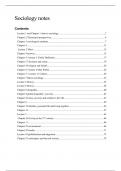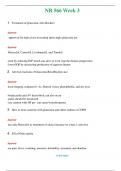Summary
Summary book and lectures Sociology for Pyschology Students - Grade 7.5
- Course
- Institution
This is a summary for the course Sociology for Psychology Students. I used both information from the lectures and from the book. I got a 7.5 for the exam by studying with this summary.
[Show more]





